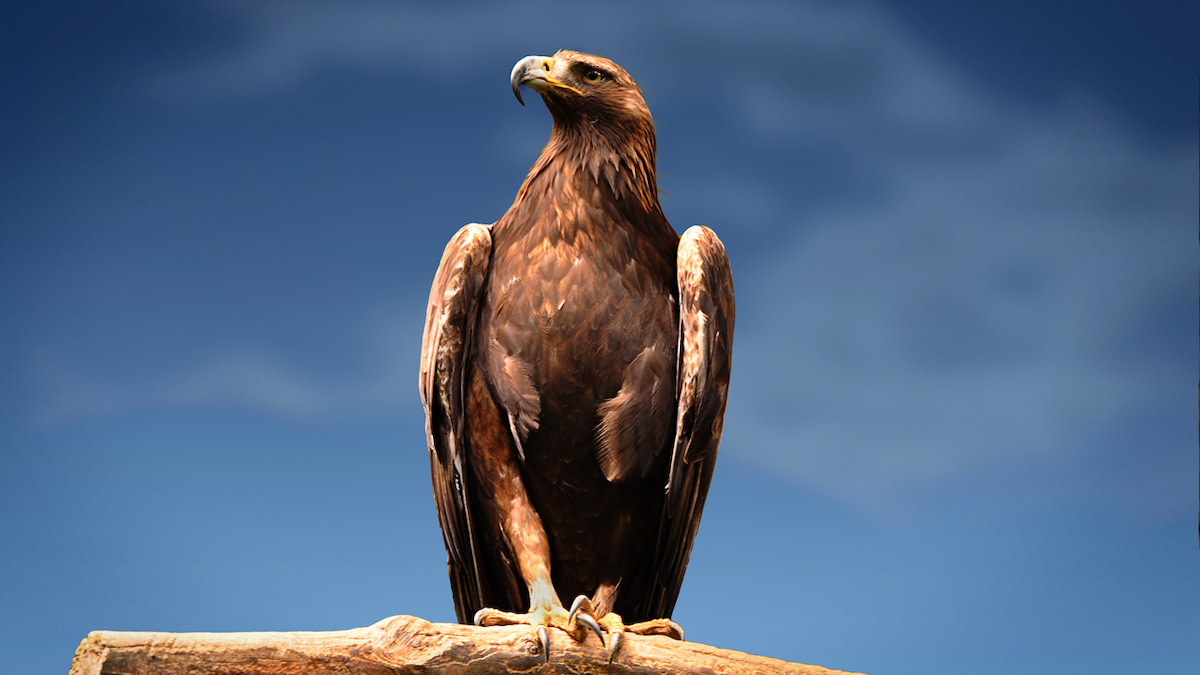
Poachers, smugglers, and other fish and game felons steal our shared natural resources, and “Cal’s Poaching Desk” is here with all the sordid details. For more stories of wildlife wrongdoing, be sure to tune in to “Cal’s Week in Review.” New episodes drop every Sunday.
In this week’s Poaching Report, we learn that not everything is better in pairs.
Raptor’s Revenge
Two Idaho men were sentenced to probation and banned from hunting after they admitted in March to killing a golden eagle in a national conservation area dedicated to birds of prey.
This wasn’t the only raptor that these two shot down. Idaho Fish and Game, the U.S. Fish and Wildlife Service, and the Bureau of Land Management began to investigate raptor deaths in March of last year after learning of multiple dead birds, according to the Idaho Statesman. They found at least ten dead raptors near ammunition casings including red tail, ferruginous, and rough-legged hawks.
Not long after, law enforcement officials observed 20-year-old Colten R. Ferdinand and 23-year-old Wyatt G. Noe using flashlights and rifles to kill birds at night.
They pleaded guilty to killing the golden eagle and were sentenced to two years of probation and banned from hunting or possessing firearms for two years. Ferdinand paid restitution totaling $3,800 and Noe paid $3,000.
The hawk species that were killed were protected under the Migratory Bird Treaty Act, and golden eagles are protected under the aptly named Bald and Golden Eagle Protection Act.
Neither man has explained why they chose to target these species, but I can only assume it stems from the fact that they’re compensating for something. But I’m no psychologist. That’s just a guess.
Florida Men
Another dynamic duo is facing charges in Florida for allegedly killing a whitetail doe with a pellet gun in a residential area. The men claimed to be hunting deer for food, which I can believe. However, they chose to do it in a neighborhood because one of them worked in the area and knew a good spot to shoot deer. It didn’t end up being a good spot. They bagged one deer but were soon caught, taken to jail, and released on $400 bond.
It's Legal If I Say It’s Legal
Here's what you might call a reverse-poaching story. Charges were dropped last month against a Las Vegas family after they released a fox that was legally trapped in the La Madre mountain range.
Husband and wife Bobby Vaske and Jessica Manners were hiking with their two children and the family dogs when they came upon the animal, which had been caught in a trap outside its den.
It’s a misdemeanor in Nevada to disturb someone else’s trap, and the pair were later cited $700 for breaking wildlife law. But instead of paying the fine and moving on, they took their case to court. They don’t believe trappers should be allowed to operate in the area, and when asked if he’d do it again, Vaske responded, “Absolutely.”
Vaske and his family plan to continue their crusade in the state legislature, where they hope to ban trapping on all public lands. That’s the old, “I did something illegal, so now I want it to be legal” defense.
A Picture Worth 1,000 Words…And a $16,000 Fine
In Oregon, wildlife officials were tipped off to a photo circulating online of a 6x6 bull elk that had been loaded whole onto a trailer.
The trooper who first reviewed the photo thought that was suspicious since, as any elk hunter knows, elk are heavy, especially when they haven’t been gutted. The animal had clearly been shot in an area accessible to the trailer, which is unusual for most hunters.
The trooper eventually determined the name of the hunter, and paid him a visit. The subsequent investigation revealed that the poacher, Lionardo Munoz, didn’t have the right tag for that elk and had shot it in an orchard near his house. When questioned, Munoz first claimed the elk was his buddy, Matt Wilkinson’s. Wilkinson claimed it was his wife’s.
Munoz was ordered to pay a $15,000 fine and his hunting privileges are suspended for three years. Wilkinson is paying a $1,000 fine and will have his license suspended for five years.
International Donkey Smuggling
China is poaching donkeys from South Africa, according to a recent report in the French news agency AFP.
A gelatin called "ejiao" is prized in China for its medicinal qualities, and it’s made primarily from donkey skins. South Africa exports about 10,000 donkey skins to China every year, but officials believe the real quantity is much higher as smugglers tap into the trade. Donkeys are reportedly stolen from farms and illegally purchased from villagers by what one animal welfare activist described as “suspicious agents.”
This isn’t just speculation. A recent study by researchers from the University of South Africa showed that the donkey population shrank from 210,000 in 1996 to about 146,000 in 2019–a 30% decline.
This story reminds me of the wild horse and burro issues we have here in the states, and all the habitat restoration work we could do with this sweet ejiao market money. Think of the ad campaign: “Do you have aches and pains? Well, don’t be a jackass, use donkey jelly, and it’ll have you braying in no time.”
For more poaching and conservation news, not to mention dope animal facts, check out “Cal’s Week in Review.” New episodes drop every Sunday.



